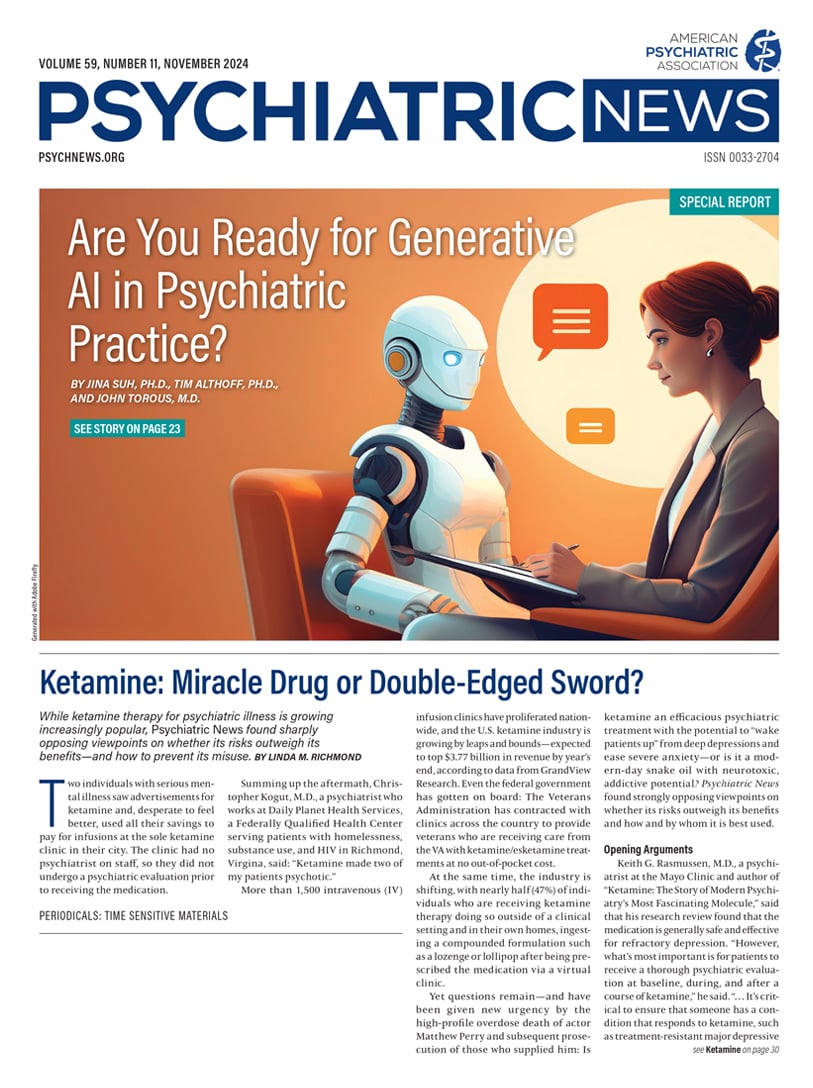It is essential for new and seasoned psychiatrists to keep up to date with the numerous and rapidly changing legal, clinical, ethical, and patient-safety developments related to prescribing. Psychiatrists may issue a prescription for controlled substances if they are
authorized to prescribe by the jurisdiction in which they are licensed
and they are registered with the Drug Enforcement Administration (DEA) or exempted from registration. Prescribers must have a DEA registration
for each state where they practice.
According to
federal law, for prescriptions for controlled substances to be valid, they must be issued for a legitimate medical purpose by a practitioner who is acting in the usual course of professional practice and has conducted at least one in-person medical evaluation of the patient. The
DEA extended COVID exceptions to allow prescribers to issue prescriptions for controlled substances via telemedicine without an in-person exam until December 31, 2024.
The DEA and state medical practice acts define accepted professional standards regarding prescribing. Before prescribing, consider the ethical, legal, and professional standards involved:
•
Is the prescription issued in the usual course of the psychiatrist’s professional practice?
•
Is the prescription written within a physician-patient relationship and for the purpose of maintaining the patient’s well-being?
•
Was a medical history, physical, and/or mental status exam conducted and documented?
•
Was the prescription drug monitoring program (PDMP) database reviewed before prescribing and/or renewal?
•
Is there a treatment plan?
•
If the prescription is written for a family member, does it meet the
emergency exception requirements?
•
Have the risks, benefits, and alternatives of the prescribed medication been reviewed with the patient and documented?
If the answer is no to any of these questions, then most likely prescribing standards have not been met.
Psychiatrists should stay abreast of current scientific evidence that supports the safety and use of prescribing medications, especially when prescribing medications off-label or with black-box warnings. It is important to clearly communicate the reason for prescribing, the scientific literature supporting the use, why the benefits of taking the medication outweigh the risks, and potential side effects associated with the use of the medication, including rare side effects that are severe when they occur. When following up or renewing prescriptions, discuss whether the patient is experiencing side effects and why continual monitoring is required, and document each conversation.
When prescribing controlled substances, there are several scenarios that psychiatrists may encounter that should raise a red flag, such as a specific request for a prescription medication, refusal to sign an authorization form to allow communication and collaboration with other providers, refusal to sign a controlled substance contract, or resistance to being tapered off the medication. The obvious red flag is a PDMP indicating that the patient receives medication from another provider (or providers).
To avoid or mitigate claims of failure to monitor, the medical record should include routine evaluation of the patient’s diagnosis, treatment plan, adherence (or lack of) to the treatment plan, effectiveness of prescribed medication, and review of possible side effects and drug interactions. Conduct testing as indicated, and follow up on the results. Document the patient’s refusal to discuss their treatment with other treatment providers, family, and others involved in their care.
Adherence to established prescribing guidelines, comprehensive patient assessments, and rigorous monitoring protocols foster better patient outcomes, uphold the integrity of the medical profession, and help to mitigate potential legal liability. ■
This information is provided as a risk management resource for Allied World policyholders and should not be construed as legal or clinical advice. This material may not be reproduced or distributed without the express, written permission of Allied World Assurance Company Holdings Ltd., a Fairfax company. Risk management services are provided by or arranged through AWAC Services Company, a member company of Allied World. © 2024 Allied World Assurance Company Holdings Ltd. All rights reserved.

